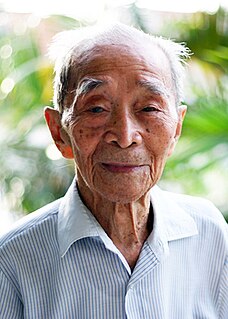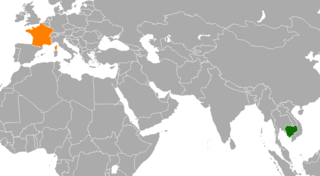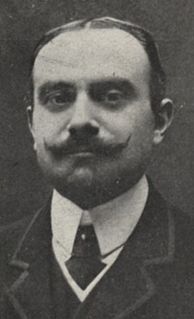Related Research Articles
António da Madalena was a Portuguese Capuchin friar who was the first Western visitor to Angkor in 1586.
Cambodians in France consist of ethnic Khmer people who were born in or immigrated to France. The population as of 2020 was estimated to be about 500,000, making the community one of the largest in the Cambodian diaspora. The Cambodian population in France is the most established outside Southeast Asia, with a presence dating to well before the Vietnam War and subsequent Indochina refugee crisis.

Soth Polin is a famous Cambodian writer. He was born in the hamlet of Chroy Thmar, Kampong Siem District, Kampong Cham Province, Cambodia. His maternal great-grandfather was the poet Nou Kan. He grew up speaking both French and Khmer. Throughout his youth, he immersed himself in the classical literature of Cambodia and, at the same time, the literature and philosophy of the West.

The Bunong (alternatively Phnong, Punong, or Pnong. The Bunong: Caretakers of Cambodia’s Sacred Forests. Phnom Penh: USAID, European Union.</ref> are an indigenous Cambodian ethnic minority group. They are found primarily in Mondulkiri province in Cambodia. The Bunong is the largest indigenous highland ethnic group in Cambodia. They have their own language called Bunong, which belongs to Bahnaric branch of Austroasiatic languages. The majority of Bunong people are animists, but a minority of them follows Christianity and Theravada Buddhism. After Cambodia's independance in 1953, Prince Sihanouk created a novel terminology, referring to the country's highland inhabitants, including the Bunong, as Khmer Loeu. Under the People's Republic of Kampuchea, the generic term ជនជាតិភាគតិច "ethnic minorities" came to be in use and the Bunong became referred to as ជនជាតិព្នង meaning "ethnic Pnong". Today, the generic term that many Bunong use to refer to themselves is ជនជាតិដើមភាគតិច, which can be translated as "indigenous minority" and involves special rights, notably to collective land titles as an "indigenous community". In Vietnam, Bunong-speaking peoples are recurrently referred to as Mnong.

Chau Sen Cocsal, also known as Chhum, was a Cambodian civil servant and politician who served as Prime Minister of Cambodia in 1962 and President of the National Assembly twice, in 1962–1963 and 1966–1968. He lived for 103 years, 143 days, making him the longest-lived state leader in the world with the known date of birth and death. The only leader possibly longer living than him is another Cambodian prime minister, Ek Yi Oun (1910–2013). Chhum was awarded the honorary title "Samdech" in 1993 by King Norodom Sihanouk.
Cambodge Soir was a weekly newspaper published in Cambodia and it was the most important French language Cambodian newspaper of the country. It was edited in Phnom Penh and distributed in different Cambodian provinces, among French speaking foreigners and Cambodians. The newspaper closed down in 2010.

Sisowath Monipong was the second son of the former King of Cambodia, Sisowath Monivong and Queen Norodom Kanviman Norleak Tevi. He took part in Cambodian politics during and after World War II.
Charles Enderlin is a French-Israeli journalist, specialising in the Middle East and Israel. He is the author of a number of books on the subject, including Shamir, une biographie (1991), Shattered Dreams: The Failure of the Peace Process in the Middle East, 1995–2002 (2002), and The Lost Years: Radical Islam, Intifada and Wars in the Middle East 2001–2006 (2007). He was awarded France's highest decoration, the Légion d'honneur, in August 2009.

Cambodia–France relations refer to the bilateral relations between the Kingdom of Cambodia and the French Republic. Cambodia was a protectorate of France from 11 August 1863 to 9 November 1953. King Norodom approached the French in 1861, in an attempt to stop neighbors Thailand and Vietnam from swallowing Cambodia's land.
The Geneva International Peace Research Institute is a non-governmental organisation based in Geneva.
Phoeurng Sackona is a Cambodian academic, engineer and politician who is the current Minister of Culture and Fine Arts. She is a member of the Cambodian People's Party. She also serves as the President of the Board of Trustees of the Institute of Technology of Cambodia. She is also the daughter-in-law of former Minister of Culture Chheng Phon.

Lucien Le Foyer was a French lawyer, pacifist and politician. He played a leading role in French and international pacifist organizations both before the after World War I (1914–18), and after World War II (1939–45). He was also an accomplished poet.
Ang Chan II was King of Cambodia from 1806 to his death in 1835. He reigned under the name of Outey Reachea III.

Ang Eng was King of Cambodia from 1779 to his death in 1796. He reigned under the name of Neareay Reachea III.
The Hun Sen Cup was the main football knockout tournament in Cambodia. The 2017 Hun Sen Cup was the 11th season of the Hun Sen Cup, the premier knockout tournament for association football clubs in Cambodia involving Cambodian League and provincial teams organized by the Football Federation of Cambodia.
An Apostle of Non-Violence is a 1997 Cambodian short feature film written, produced, and directed by King Norodom Sihanouk. Starring Khai Prasith, the film tells the story of a Buddhist monk trying to preach non-violence to opposing groups of a civil war. King Norodom wrote the film's screenplay in 1994, with production underway by 1996.
Institut Pasteur du Cambodge is a medical research centre and public health institute in Phnom Penh, Cambodia. It is part of the Pasteur Institute's international network of health centres and is partnered with the Ministry of Health. It was first established in 1953 and reopened in 1992 after the 1991 Paris Peace Agreements.
Ros Chantrabot is a Khmer novelist, poet, historian and member of the Royal Academy of Cambodia.
Nelly-Pierrette Guesde, best known by her pen name Makhali-Phâl, was a French Cambodian poet and novelist.

The law of Cambodia refers to the legal system of the judiciary of Cambodia, which is primarily based on legal codes and statutes, with precedents and local custom also playing an important role. Cambodia has a civil law legal system with legal codes, which were greatly influenced by France, to a lesser extent by Japan, and also adapted to Cambodian circumstances. The Constitution of Cambodia enacted with the restoration of Monarchy in 1993 and it is the supreme law in Cambodia. An independent judiciary has the power to review laws and government acts for constitutionality.